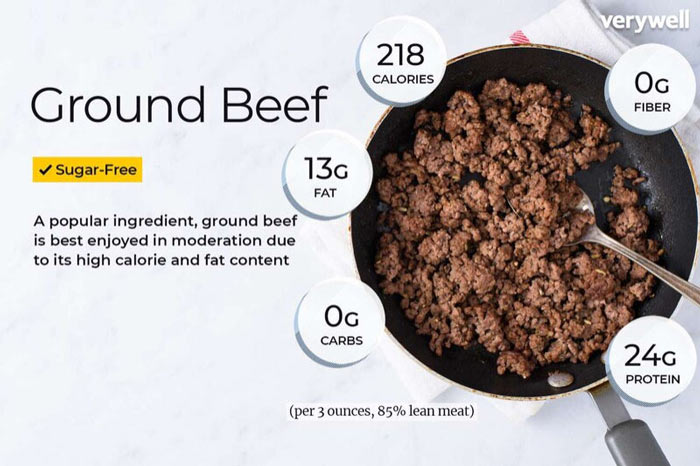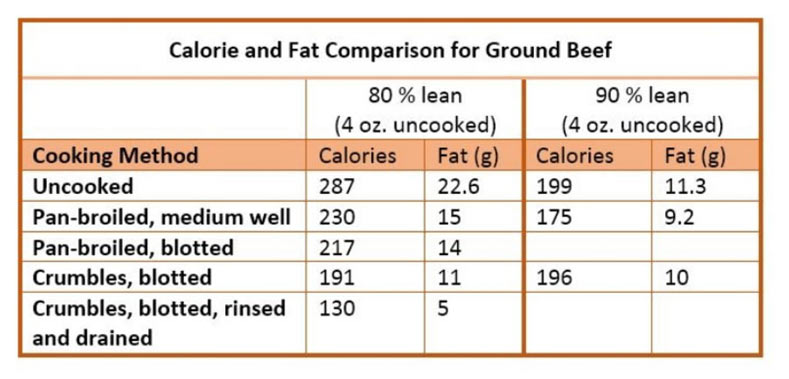Everything You Need to Know About Ground Beef’s Nutrition and Health
Nov 30, 2023 By Nancy Miller
Countless recipes worldwide incorporate ground beef. To make informed dietary choices, understanding the nutrition facts and health benefits of ground beef, derived from various cuts of beef, is essential. It goes beyond its culinary uses. Essential nutrients abound in ground beef, contributing significantly to overall health. In this comprehensive exploration, we delve into the nutrition facts and health benefits of incorporating ground beef into your diet.

Ground Beef Nutrition
Protein Content
The impressive protein content of ground beef serves as a potent source for fostering muscle development and maintaining essential bodily functions. Our bodies rely on proteins to play a crucial role in tissue formation and repair.
Ground beef's complete protein provides all the essential amino acids, which are unattainable through self-production within the body. Ground beef offers a comprehensive and effective source of protein. It proves particularly beneficial for individuals involved in physical activities or aiming to augment their protein intake.
Vitamins and Minerals
Ground beef, in addition to its protein prowess, harbors a wealth of essential vitamins and minerals. Plentiful B vitamins, such as B12 and niacin, contribute not only to energy metabolism but also to neurological health. The presence of iron is also notable.
Moreover, ground beef offers this vital mineral in a highly absorbable form. Hence, it emerges as an excellent choice for preventing iron deficiency anemia. The zinc content promotes immune function, accelerates wound healing; and maintains healthy skin.

Healthy Fats in Ground Beef
Ground beef, contrary to common misconceptions, harbors healthy fats that significantly bolster overall well-being, notably omega-3 fatty acids, acclaimed for their cardiovascular advantages.
In terms of heart health specifically, these lipids quell inflammation, enhance cholesterol levels, and foster the ideal operation of blood vessels. Choosing lean cuts of ground beef--despite its inherent saturated fats strikes a balance. You can enjoy this delectable protein source while maintaining heart health.
Health Benefits of Ground Beef Consumption
Muscle Health and Development:
Individuals engaged in physical activities or seeking to build muscle consider the protein content of ground beef a cornerstone. Composed of amino acids, proteins find their rich source in this food item.
Ground beef's ideal choice for supporting muscle health arises from the crucial role amino acids play in repairing and rebuilding muscle tissues. Ground beef's protein, in addition to its other benefits, aids in sustaining energy release. This enhances muscle endurance during physical exertion.
Iron Absorption and Energy Levels:
Ground beef contains iron, a fundamental component that plays a vital role in numerous physiological processes, preventing iron deficiency. Moreover, and this is key to note, the body relies on ground beef's iron for supporting oxygen transport throughout its various systems.
This aids in maintaining optimal energy levels becomes possible through regular consumption of such foods. Particularly during periods marked by heightened physical activity, this proves indispensable in staving off fatigue. The body readily absorbs heme iron, a highly bioavailable source of this essential mineral found abundantly in ground beef for its convenience and flavor.
Supporting Bone Health:
Phosphorus and zinc, essential minerals that are paramount for robust bone health, particularly in terms of maintaining density and strength, stand as key players within ground beef. Phosphorus works alongside calcium to guarantee optimum bone density.
Meanwhile, zinc significantly contributes not only to bone metabolism but also mineralization: an integral part of fortifying the overall integrity of our skeletal system. Incorporating ground beef into your diet provides your body with essential minerals and a solid foundation for strong, resilient bones.
Omega-3 Fatty Acids and Joint Health:
Ground beef, sourced from grass-fed cattle in particular, boasts omega-3 fatty acids alongside its protein and mineral content. Renowned for their anti-inflammatory properties, these essential fats actively support joint health.
The inclusion of omega-3 fatty acids in ground beef might reduce inflammation within joints; this potential could provide relief from symptoms linked to conditions like arthritis. For those seeking to maintain flexibility and joint function, incorporating ground beef becomes a valuable addition.
Vitamin B Complex for Nervous System Health:
Various B vitamins, such as B12, B6, and niacin, are sourced from ground beef. They play a crucial role in maintaining a healthy nervous system. Vitamin B12 is essential for nerve cell function and instrumental to the production of myelin (a protective layer around nerves). It’s an imperative component within this context. Your diet's incorporation of ground beef can enhance your nervous system's overall well-being, bolstering cognitive function and nerve transmission.
Practical Tips to Incorporate Ground Beef into Your Diet
Balancing Nutrient Intake:
To achieve a balanced diet, one must comprehend the contributions of various foods to overall nutrition. Mastering the art of incorporating ground beef into your meals and maintaining a well-rounded and varied diet is crucial in this endeavor.
Cooking Methods for Maximum Nutrient Retention:
Explore the recommended cooking methods that retain ground beef's maximum nutritional value and optimize your intake of this protein-rich food. Understanding the cooking process directly impacts its nutritional content.

Considerations for Different Dietary Preferences:
Explore the versatile ways to include ground beef, whether you adhere to a specific diet or have dietary restrictions. Discover suitable alternatives and recipe ideas for individuals with diverse dietary preferences. This is for those on ketogenic or paleo diets or seeking vegetarian options, and others who prioritize gluten-free eating.
Making Informed Choices for a Healthier You
Concluding our exploration of ground beef nutrition facts and health benefits, we see that this culinary staple provides more than mere flavor. By comprehending its nutritional profile, and strategically integrating it into your diet, you can relish the advantageous health effects it offers.
Mindful consumption of ground beef enhances a well-rounded eating plan. It’s essential to support you on your journey to optimal health.
To summarize, ground beef is more than merely a delectable complement to your meals. It offers an invaluable collection of vital nutrients. Thus, its inclusion in any balanced, health-conscious diet is not just recommended but necessary.







